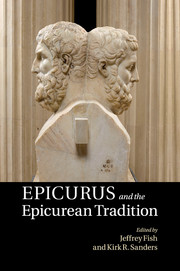Book contents
- Frontmatter
- Contents
- Acknowledgements
- Note on Abbreviations
- List of Contributors
- 1 Introduction
- 2 Autodidact and student: on the relationship of authority and autonomy in Epicurus and the Epicurean tradition
- 3 Epicurus' theological innatism
- 4 Epicurus on the gods
- 5 Not all politicians are Sisyphus: what Roman Epicureans were taught about politics
- 6 Epicurean virtues, Epicurean friendship: Cicero vs the Herculaneum papyri
- 7 Cicero's use and abuse of Epicurean theology
- 8 The necessity of anger in Philodemus' On Anger
- 9 Philodemus, Seneca and Plutarch on anger
- 10 Philodemus and the fear of premature death
- Bibliography
- General index
- Index of passages
7 - Cicero's use and abuse of Epicurean theology
Published online by Cambridge University Press: 01 June 2011
- Frontmatter
- Contents
- Acknowledgements
- Note on Abbreviations
- List of Contributors
- 1 Introduction
- 2 Autodidact and student: on the relationship of authority and autonomy in Epicurus and the Epicurean tradition
- 3 Epicurus' theological innatism
- 4 Epicurus on the gods
- 5 Not all politicians are Sisyphus: what Roman Epicureans were taught about politics
- 6 Epicurean virtues, Epicurean friendship: Cicero vs the Herculaneum papyri
- 7 Cicero's use and abuse of Epicurean theology
- 8 The necessity of anger in Philodemus' On Anger
- 9 Philodemus, Seneca and Plutarch on anger
- 10 Philodemus and the fear of premature death
- Bibliography
- General index
- Index of passages
Summary
The identity of the sources Cicero employed in writing his De natura deorum (hereafter ND) has been much debated. With regard to the first book's account of Epicurean doctrine in particular, attention has naturally turned to the remains of the Epicurean library found at Herculaneum's Villa dei Papiri. Many of the specifically theological works discovered among these remains have yet to receive a proper modern edition. In the case of their more poorly conserved passages, prudence dictates awaiting more securely established texts. But these same works also contain a good deal of material that may already be referred to with confidence, and which promises to shed new light on, among other things, Cicero's sources for ND 1.
The most extensive theological treatises to have survived at Herculaneum are by Philodemus of Gadara. The best known of these, thanks in large part to the recent work of D. Obbink, is the treatise On Piety (De pietate). Thematic correspondences between this work and the doxographical account in Cicero's ND 1 (= 1.18–41) had already been noted by some of the earliest scholars to work on Philodemus' treatise. Diels' monumental Doxographi Graeci printed relevant fragments from On Piety side by side with Cicero's text. Subsequent investigation of the relationship between the two works has proven fruitful both for the reconstruction of Philodemus' On Piety and for the understanding of Cicero's working method.
- Type
- Chapter
- Information
- Epicurus and the Epicurean Tradition , pp. 129 - 151Publisher: Cambridge University PressPrint publication year: 2011
- 2
- Cited by



